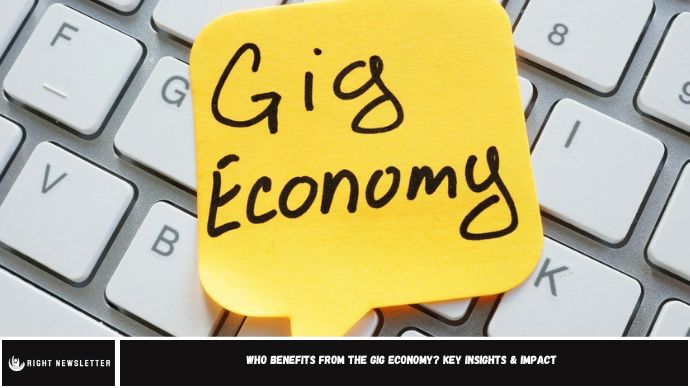The gig economy is transforming the global workforce, but who truly benefits from this shift? The rise of freelancing, contract work, and digital platforms has changed the way people earn, but it’s not always clear who stands to gain the most. Whether you’re a freelancer, an entrepreneur, or a large corporation, the gig economy presents unique opportunities and challenges. In this article, we will explore the individuals and industries that benefit most from the gig economy, the challenges they face, and how this new economic model is reshaping our working lives.
What is the Gig Economy?
The gig economy refers to a labor market characterized by short-term contracts, freelance work, and digital platforms that connect workers with clients. Unlike traditional full-time employment, gig workers are typically hired for individual tasks or projects, offering flexibility in both work hours and location.
Key Benefits of the Gig Economy
- For Workers: The gig economy provides flexibility, autonomy, and the potential for higher income. Freelancers and independent contractors can select projects that align with their skills and interests, work from home, and have control over their schedules.
- For Employers: Companies benefit from the gig economy by gaining access to a global talent pool without the long-term commitment of hiring full-time employees. They can scale their workforce up or down based on demand, allowing for significant cost savings.
- For Consumers: Customers benefit from the gig economy through increased convenience, affordability, and a wide range of services at their fingertips. From ride-sharing to home repairs, consumers enjoy faster, on-demand services at competitive prices.
Who Are the Primary Beneficiaries?
Freelancers & Independent Contractors
The most obvious beneficiaries of the gig economy are freelancers and independent contractors. With platforms like Upwork, Fiverr, and TaskRabbit, workers can tap into a global market, find jobs that suit their skills, and enjoy the freedom of setting their own hours.
Tech Companies and Platforms
Digital platforms such as Uber, Airbnb, and Instacart have revolutionized industries by making it easier for people to offer services and earn income. These platforms benefit by acting as intermediaries, earning a commission while expanding the scope of services they offer.
Startups and Small Businesses
Startups and small businesses can also thrive in the gig economy. By hiring freelancers for specific tasks (like marketing, web design, or data analysis), they can reduce overhead costs and access specialized talent without the need for permanent hires.
Large Corporations
Large organizations benefit from the gig economy by utilizing independent contractors for specific roles, such as consultants or project managers. This flexibility allows big companies to be agile and quickly adjust their workforce needs.
Challenges for Gig Economy Workers
While the gig economy offers numerous benefits, it’s not without challenges. Gig workers often face lack of benefits (healthcare, retirement plans), job insecurity, and inconsistent income. Unlike traditional employees, gig workers may not be entitled to job protections or workers’ rights, which can create uncertainty in their careers.
The Future of the Gig Economy
The gig economy is rapidly growing and evolving. According to a report by McKinsey, over 20-30% of the working-age population in the U.S. engages in some form of independent work. The future of the gig economy will likely include more regulation, as governments address concerns around workers’ rights and protections. Technology will continue to play a central role, with artificial intelligence and automation driving new opportunities for gig workers to connect with clients and expand their skillsets.
Conclusion
The gig economy offers clear benefits for workers seeking flexibility, companies looking for cost-effective talent, and consumers enjoying on-demand services. However, challenges such as job insecurity and lack of benefits persist, particularly for workers in vulnerable positions. As the gig economy continues to grow, finding a balance between innovation and fair labor practices will be crucial for ensuring that all participants benefit from this evolving economic model.
FAQs:
What is the gig economy?
The gig economy is a labor market where short-term, freelance, and contract-based work is common, typically facilitated by digital platforms like Uber, Fiverr, and TaskRabbit.
Who benefits most from the gig economy?
Freelancers, small businesses, tech companies, and large corporations all benefit from the gig economy, but gig workers themselves often face challenges such as job insecurity.
What are the advantages of gig work for employees?
Gig workers enjoy flexibility, control over their schedules, and the ability to work from home. They can also select projects that align with their skills and interests.
How do companies benefit from the gig economy?
Companies can tap into a global talent pool, scale their workforce quickly, and reduce overhead costs by hiring freelance workers for specific tasks rather than full-time employees.
What challenges do gig economy workers face?
Gig workers often lack access to traditional benefits like healthcare and retirement plans, and they may experience inconsistent income and job insecurity.
What does the future of the gig economy look like?
The gig economy is expected to grow, with more regulation around workers’ rights and continued advancements in technology and automation.

